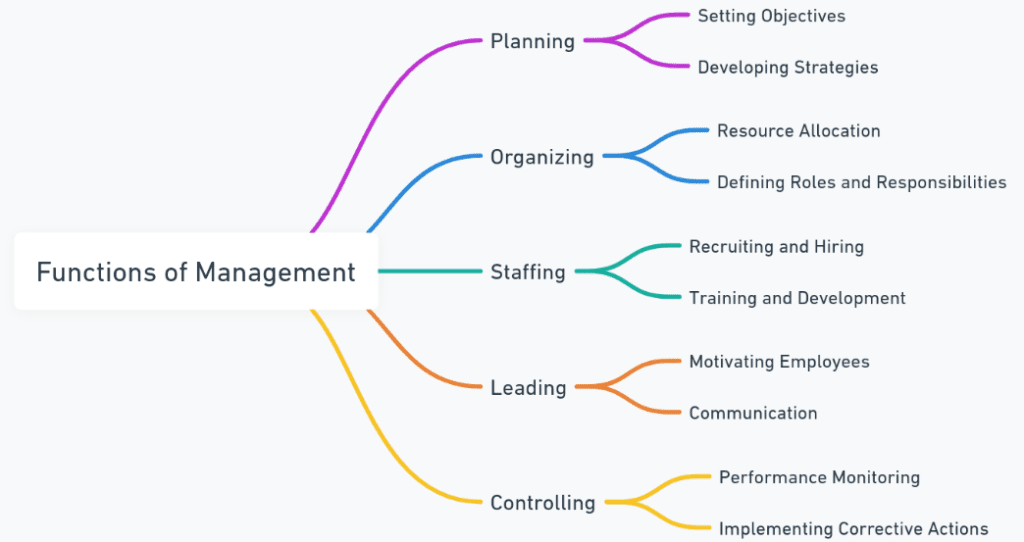Management and entrepreneurship fundamentally differ in scope, roles, and approaches. Management is all about maintaining, optimizing, and leading operations within an established organization, whereas entrepreneurship is more about innovation, creating new ventures, and risking the unknown. Understanding the difference helps in separating those who intend to optimize existing resources from those who create new opportunities within the business landscape.
What is Management?
Management refers to the coordination and organization of activities within an organization aimed at achieving defined objectives. Management involves planning, organizing, leading, and controlling all available resources, such as finances, human capital, and technological assets, to fulfill the mission and vision of a company as efficiently as possible. Management works within an already structured framework, with a series of strategies and practices maximizing production and growth based on specific resources and goals.
Characteristics of Management
- Goal-Oriented: Every managerial activity is aimed at achieving organizational objectives.
- Continuous Process: Management is an ongoing process with interconnected functions.
- Dynamic: Adaptable to internal and external business environment changes.
- Resource Optimization: Ensures optimal utilization of resources like time, money, and talent.
Functions of Management
The functions of management encompass key activities crucial for the success and sustainability of any organization:
- Planning: Setting objectives and developing strategies to accomplish them. It is the foundational function that determines the course of action and allocates resources effectively.
- Organizing: Coordinating resources and assigning tasks. This includes creating a structured hierarchy to optimize workflow.
- Leading: Guiding and motivating employees toward the organization’s objectives. Effective leadership involves communication, decision-making, and inspiring the team.
- Controlling: Monitoring progress towards goals and making adjustments as needed. This involves setting benchmarks, evaluating performance, and implementing corrective actions when required.

What is Entrepreneurship?
Entrepreneurship refers to the process of creating, developing, and running a new business venture. An entrepreneur is rather more of an innovator of new products, services, or even new business models. An entrepreneur has the potential to identify any needs of the market and solve specific problems that people encounter in the innovation of new products. Entrepreneurship is somewhat different from management in that one is working within the already structured framework of an organization. Entrepreneurship requires taking risks and facing unknowns in bringing new ventures to life.
Characteristics of Entrepreneurship
- Innovation and Creativity: Entrepreneurs identify market gaps and offer novel solutions.
- Risk-Taking: Entrepreneurship involves substantial risk, given that many startups face challenges in achieving profitability.
- Visionary Thinking: Entrepreneurs possess foresight and can anticipate industry trends, guiding them in their ventures.
- Value Creation: Entrepreneurship focuses on generating value for customers, employees, and investors through innovative solutions.
Management vs Entrepreneurship: Key Difference
Management and entrepreneurship are essential components for any organization, but they have different roles. Management sustains and grows the organizations by maximizing available resources. Entrepreneurship creates innovations and new avenues as well as business models. When these two are merged by highly skilled management and dynamic entrepreneurship, they tend to move the organizations toward long-term growth and industry impact.
| Key Aspect | Management | Entrepreneurship |
|---|---|---|
| Objective | Optimizing operations to meet organizational goals | Creating and developing new business opportunities |
| Risk | Minimal, focuses on risk management | High, involves starting from scratch |
| Innovation | Incremental changes for efficiency | Fundamental changes and innovations |
| Role | Leading and coordinating within existing frameworks | Building new frameworks and models |
| Resources | Utilizes established resources | Seeks and secures resources independently |
| Decision-Making | Based on data and precedents | Often based on intuition and market vision |
Management and Entrepreneurship FAQs
Is an entrepreneur a manager?
Entrepreneurs often take on managerial roles, especially in the early stages of a business, but their primary role is creating and scaling new opportunities.
Can managers be entrepreneurs?
Yes, managers can be entrepreneurs if they start a new venture or innovate within an organization, known as intrapreneurship.
What are the risks in management vs. entrepreneurship?
Management usually involves risk mitigation within a stable framework, whereas entrepreneurship involves higher risks associated with starting new ventures.
What skills overlap between management and entrepreneurship?
Both require strong decision-making, leadership, and problem-solving skills.
How does innovation differ in management vs. entrepreneurship?
Innovation in management is often incremental, focusing on efficiency. In entrepreneurship, innovation is more radical, aiming to disrupt or create new markets.


